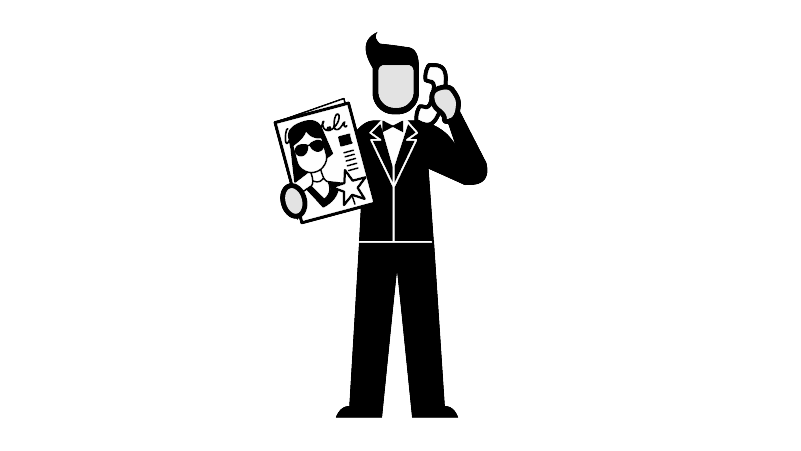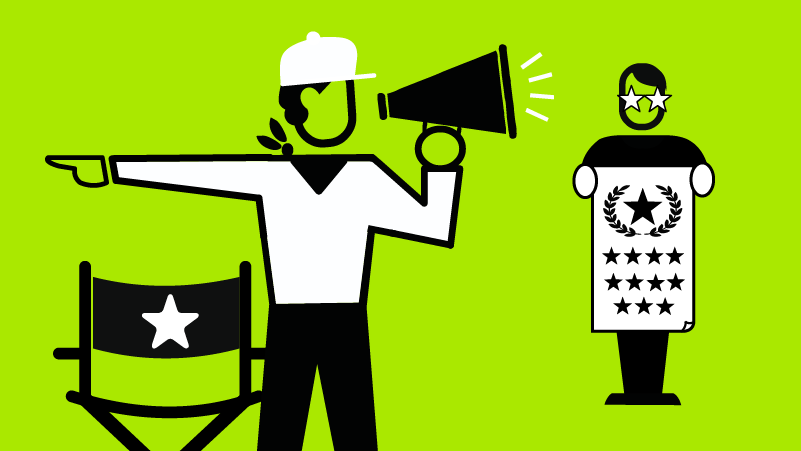Unscripted TV
Celebrity producer
Also known as: Celebrity booker

What does a celebrity producer do?
Celebrity producers ensure Graham Norton has a full sofa, I’m a Celebrity has the right mix of famous faces and Strictly Come Dancing has a cast that will keep people voting right through the autumn.
Celebrity producers know what all the stars are doing, the stories and gossip and who to contact to book them. From A-listers to Z-listers, celebrity producers have longstanding relationships with agents, publishing companies, press officers and PR agencies. This is essential as they often compete with other celebrity producers to secure an exclusive or book the celebrity their production wants. They are skilled negotiators and experienced at making deals to secure the celebrity for their show.
They love all forms of entertainment, from TV, film and theatre to music and books, and have a busy social life attending premieres and press launches. They get to know who the new stars are going to be and are quick to make contact with agents so that when a production is interested, they have a better chance of booking them. It also works the other way and celebrity producers are often approached by agencies who would like to get their clients more exposure.
Celebrity producers exercise their own editorial judgement on who to pitch to productions. When they do, they prepare and present a well-researched and clear editorial brief. Often a series producer will already have an idea of which celebrities they would like booked for their show and together they will make a final decision.
Celebrity producers usually accompany and manage celebrities during filming, liaising between them and the production team to ensure the series producer gets the required content and the celebrity is happy.
They may be on the staff of productions that require regular guests, such as chats shows, talent, magazine or music programmes, but many are freelance and are hired by production companies when they have a show that requires celebrities to take part, from reality and survival shows to charity challenges, travelogues and talent contests.
Read
- Get that job: celebrity booker
- This is how they pick the line-up on I’m a Celebrity…Get Me Out of Here!
What’s a celebrity producer good at?
- Knowledge of celebrity: be across all entertainment genres, have in-depth knowledge of current and past stars, know who’s hot and who’s not
- Building contacts: have established relationships with agents, PR, publishers and press agencies and know who represents which celebrity
- Negotiation: be a persuasive negotiator, confident at securing deals
- Diplomacy: balance demands of production with demands of celebrity or agents, be able to handle tricky people and deal with difficult demands
- Knowledge of production: understand the tone, style, audience and requirements of different shows, suggest and book celebrities accordingly
Who does a celebrity producer work with?
Celebrity producers work directly to the series producer and on a day-to-day basis may manage a small team of bookers and researchers and work with other producers and assistant producers. Externally they’ll spend a lot of time meeting and communicating with talent agencies, press departments, public relations companies, publishers, music labels and, on occasion, the celebrities themselves.
How do I become a celebrity producer?
Celebrity producers have usually gone from researcher to assistant producer on entertainment and reality shows, where they have established good relationships with agents and agencies and worked with a lot of celebrities.
At school or college:
You can take A-levels or Highers in media studies or pretty much any subject that you like and envisage unscripted TV programmes being made about.
If you want to go straight into a job or apprenticeship, the following Level 3 vocational qualifications will equip you:
- BTEC National Extended Diploma in Creative Digital Media Production.
- Aim Awards Diploma in Creative and Digital Media
- OCR Technical Diploma in Digital Media (Moving Image and Audio Production)
- BTEC National Diploma in Film and Television Production
- BTEC National Extended Diploma in Creative Digital Media Production
- UAL Diploma/Extended Diploma in Creative Media Production and Technology
Get an apprenticeship:
An apprenticeship is a job with training, so it’s a great opportunity to earn as you learn. It can also be a good way of getting into the TV industry. Go to ScreenSkills information on apprenticeships for the main apprenticeship schemes in television. If you can’t find a role in TV, it might be worth finding on in a related industry such as theatre, journalism or video production. This will give you skills that you can then transfer into TV at a later point. Check out What’s an apprenticeship? to learn more about apprenticeships and find an apprenticeship to learn how to find one in your region, or approach companies directly.
Get a degree:
You don’t need a degree to be a celebrity producer. If you want one, you might want to take a degree with links to the TV industry. Have a look at ScreenSkills’ list of recommended courses and select one in unscripted TV. We recognise courses with our ScreenSkills Select award where they offer training in the relevant software, dedicated time to building a portfolio and have strong links with the unscripted TV industry.
Get work experience:
Try to get work experience by writing to local production companies and asking if they offer any. Keep an eye out for work experience opportunities at the BBC, ITV, Channel 4, Sky and the PACT Indie Diversity Training Scheme.
Look outside the industry:
You may wish to consider gaining experience at talent agencies to develop an understanding of how to manage the demands of people and productions. The charity events sector will also have opportunities to gain transferable experience such as communicating with celebrity patrons and booking people for events. These are good opportunities to develop your skills.
Network:
Get to know people in the unscripted TV industry by attending events. Meet professionals and ask them questions about their work, while demonstrating interest in and knowledge of the industry. Offer to provide them with your professional contact details and try to stay in touch with them. Go to how to network well to learn how to do this.
Network online:
Create a LinkedIn profile. See if there are Facebook pages or other social media groups for people making unscripted TV in your area. There might even be groups for runners and trainees. Join them. Create a ScreenSkills profile. There are a lot of crewing agencies that will charge you to be on their books. Sign up to the free ones initially. Wales Screen, Northern Ireland Screen and other areas offer free crew databases. Find a film office near you and get connected. If you do sign up to paid sites, make sure they specialise in the areas in which you’re interested.
Search for jobs:
Research unscripted TV production companies that you’d like to work for and watch the programmes that they make. Regularly check their websites and job listings websites to see if they are advertising for roles. You can also send in a short speculative letter with your CV to the head of talent. Register your CV on websites like The Talent Manager, which is used by most broadcasters and independent production companies when looking for staff. StartinTV offers tips on creating your CV and attending interviews, as well as some advice for your first day working in TV.
You might also be interested in...
Being a production executive in the unscripted TV industry. You might also be interested in being a casting director in the film and TV drama industries.







